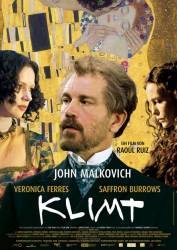
KLIMT
France, 2006, 131 minutes, Colour.
John Malkovich, Veronica Ferres, Stephen Dillane, Saffron Burrows, Nikolai Kinski.
Directed by Raoul Ruiz.
Klimt received very mixed reviews on its release, which limited further release. Many audiences were expecting a straightforward biography of the Austrian artist Gustav Klimt. However, Raoul Ruiz has never been interested in making straightforward films. He has filmed Proust and other classic writers and is interested in states of mind, time shifts, fantasy and reality. This means that this film is more a portrait of Klimt, even a portrait of his inner states of mind which were the source of his art and his eccentric behaviour.
Klimt received a medal in the Paris Exposition of 1900. He had a very fruitful period from that time to his death of pneumonia (rather than syphilis as suggested in the film) in 1918.
One of the difficulties is that John Malkovich portrays Klimt. Malkovich can be very mannered, low-key, eccentric. This is very much the case here – perhaps encouraged by the eccentricities of the director and his aims. Veronica Ferres is Midi, the fashion show owner so influential in Klimt’s life. Stephen Dillane portrays a secretary who may or may not exist. Saffron Burrows is a creation of the film, called Lea de Castro, who appears as an influence on Klimt, seductive as well as contradictory. There are two Lea de Castros in the imagination of Klimt.
The film also portrays Emily, who stayed with Klimt all his life as well as the model Mizzi who bore him two children. He had a large number of children as well as many mistresses.
The film does not show so much of Klimt’s art work. It was sexual and sensual in its nature – perhaps reflecting his own drives. However, there was a madness in Klimt, seen in the portrayal of his mother and sister who also had mental difficulties.
There are the usual jealousies of other artists as well as of politicians trying to control Klimt and his art work.
The film is perhaps for connoisseurs of films about artists and their creativity rather than a film for the general public.
1.Films of artists, portraits, biographies, studies, imagination and art, fantasy?
2.The work of Raoul Ruiz, complex, periods and history, classics?
3.Audience awareness of Klimt, as a person, as an artist, his reputation? The portrait of his painting rather than his paintings in the film?
4.Vienna, turn of the century, Paris, the Exposition? The Fan d' Siecle atmosphere, lavish?
5.Klimt as dying, the flashbacks, the past, his imagination? His illness, the women?
6.His life in Vienna, growing up, his art, his work, studio, the women? His reputation?
7.Paris, the meeting with Georges Melies, making the film, the elaborate technology of the beginnings of film-making? Film and art?
8.Lea de Castro, in herself, the meetings, the influence, the relationship, the effect? Real or unreal? Her identity?
9.Klimt’s mother, sister, their rants, their influence on Klimt, their mental states?
10.Klimt’s work in the early 20th century, growing reputation, influence?
11.Klimt as a personality, likable or not? His attitude towards people, fighting in the streets, arguments, politicians? His exploitation of people?
12.The importance of reality and fantasy? The restaurants, the waiters, the politicians, boxing in the streets, the women?
13.The role of the secretary, function, realistic or not? With Lea de Castro? The discussions and the mystery?
14.Lea, a symbol for the film, truth, fantasy, imagination and reality? Relationships, rejection, sexuality, sensuality?
15.Emily and her staying with Klimt, their relationship, her being the manager? Mizzi, the model, the mistress, the frantic rejection, the children? Midi and her management of fashion?
16.The overall impact of the film – an experience of Klimt and his art and processes rather than a biography?